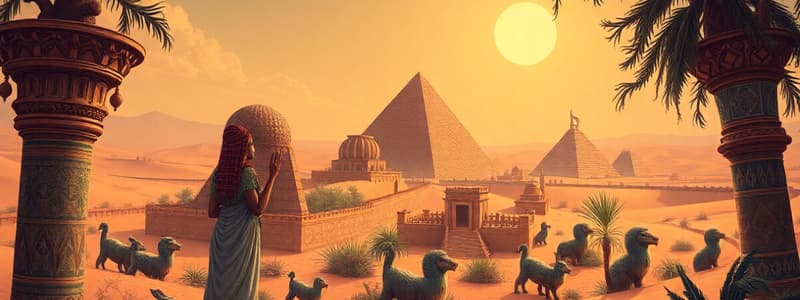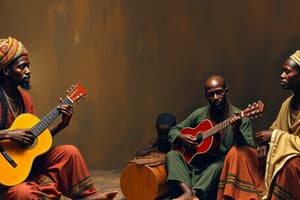Podcast
Questions and Answers
What percentage of the world's surface does Africa cover?
What percentage of the world's surface does Africa cover?
- 10%
- 15%
- 20% (correct)
- 25%
Which climate zone is the largest in Africa?
Which climate zone is the largest in Africa?
- Mediterranean
- Desert
- Tropical rainforest
- Savannah (correct)
What event transformed the Sahara into a desert?
What event transformed the Sahara into a desert?
- Urbanization
- Civilization decline
- Desertification (correct)
- Colonization
What language is considered Africa’s root language?
What language is considered Africa’s root language?
Which of the following resources was NOT mentioned as being found in Africa?
Which of the following resources was NOT mentioned as being found in Africa?
What was the significance of Meroe in the context of ancient African civilizations?
What was the significance of Meroe in the context of ancient African civilizations?
What factor contributed to Nubia's decline in style during its golden age?
What factor contributed to Nubia's decline in style during its golden age?
Which ancient civilization rose as a significant power in North Africa?
Which ancient civilization rose as a significant power in North Africa?
What was the primary advantage of camels in trade across the Sahara?
What was the primary advantage of camels in trade across the Sahara?
What was the main reason for the economic success of the Kingdom of Ghana?
What was the main reason for the economic success of the Kingdom of Ghana?
Which statement about Mansa Musa is accurate?
Which statement about Mansa Musa is accurate?
Why did Sonna Ali not adopt Islam during his rule?
Why did Sonna Ali not adopt Islam during his rule?
What major factor led to the spread of Islam in West Africa?
What major factor led to the spread of Islam in West Africa?
Which of the following accurately describes the capital of the Kingdom of Ghana?
Which of the following accurately describes the capital of the Kingdom of Ghana?
What notable characteristic defined the walled city-states built by the Hausa?
What notable characteristic defined the walled city-states built by the Hausa?
What unique farming technique is still employed by some communities in Africa today?
What unique farming technique is still employed by some communities in Africa today?
Which of the following statements is true regarding the Bantu-speaking people?
Which of the following statements is true regarding the Bantu-speaking people?
Which type of governance was practiced in the kingdom of Kongo?
Which type of governance was practiced in the kingdom of Kongo?
What was a major factor contributing to the decline of the kingdom of Axum?
What was a major factor contributing to the decline of the kingdom of Axum?
What characterized the family patterns in some African cultures?
What characterized the family patterns in some African cultures?
How did the spread of international trade influence East Africa?
How did the spread of international trade influence East Africa?
What role did consensus play in village decision-making?
What role did consensus play in village decision-making?
Which of the following statements about the artistic traditions in Africa is true?
Which of the following statements about the artistic traditions in Africa is true?
What was a common feature of the East African city-states?
What was a common feature of the East African city-states?
What contributed to the decline of Great Zimbabwe?
What contributed to the decline of Great Zimbabwe?
Which of the following best describes the religious beliefs held by many African people?
Which of the following best describes the religious beliefs held by many African people?
What impact did the monsoon winds have on trade in East Africa?
What impact did the monsoon winds have on trade in East Africa?
Flashcards
Desertification
Desertification
The process of fertile land turning into desert due to climate change and human activities.
Savannah
Savannah
A vast grassland region with distinct wet and dry seasons, found in Africa.
Sahara Desert
Sahara Desert
The largest desert on Earth, located in North Africa.
Great Rift Valley
Great Rift Valley
Signup and view all the flashcards
Meroe
Meroe
Signup and view all the flashcards
Carthage
Carthage
Signup and view all the flashcards
Bantu
Bantu
Signup and view all the flashcards
Upper Nile
Upper Nile
Signup and view all the flashcards
Democratic Government
Democratic Government
Signup and view all the flashcards
Shared Power
Shared Power
Signup and view all the flashcards
Consensus
Consensus
Signup and view all the flashcards
Patrilineal
Patrilineal
Signup and view all the flashcards
Matrilineal
Matrilineal
Signup and view all the flashcards
Clan
Clan
Signup and view all the flashcards
Age Grades
Age Grades
Signup and view all the flashcards
Polytheism
Polytheism
Signup and view all the flashcards
Axum Trade Network
Axum Trade Network
Signup and view all the flashcards
Rise of Muslim Communities
Rise of Muslim Communities
Signup and view all the flashcards
Roman conquest of Carthage
Roman conquest of Carthage
Signup and view all the flashcards
Roman influence on North African infrastructure
Roman influence on North African infrastructure
Signup and view all the flashcards
Spread of Christianity in North Africa under Roman rule
Spread of Christianity in North Africa under Roman rule
Signup and view all the flashcards
Importance of camels in Saharan trade
Importance of camels in Saharan trade
Signup and view all the flashcards
Trade of gold and salt in West Africa
Trade of gold and salt in West Africa
Signup and view all the flashcards
Founding of the Kingdom of Ghana
Founding of the Kingdom of Ghana
Signup and view all the flashcards
The two cities of the Kingdom of Ghana
The two cities of the Kingdom of Ghana
Signup and view all the flashcards
Spread of Islam in West Africa
Spread of Islam in West Africa
Signup and view all the flashcards
Sundiata Keita and the Malian Empire
Sundiata Keita and the Malian Empire
Signup and view all the flashcards
The Malian Empire under Mansa Musa
The Malian Empire under Mansa Musa
Signup and view all the flashcards
Study Notes
Early African Civilizations
- Africa is the second-largest continent, covering 20% of the Earth's surface. Its geography varies greatly, including diverse climate zones (tropical rainforests, savannas, deserts), coastlines, and resources (salt, gold, iron, copper).
Migration of Peoples and the Changing Sahara
- The Great Rift Valley is considered a potential origin point for early humans.
- Around 5500 BCE, farming developed in the Nile Valley, leading to villages in the Sahara. Cave paintings depict a forested Sahara.
- Desertification, a gradual process of climate change, transformed the Sahara from a forested region into a desert.
The Nile Kingdom of Nubia
- Nubia, located along the upper Nile, developed rich civilizations.
- Nubian and Egyptian civilizations interacted closely, leading to shared rule and cultural exchange.
- Nubia's strategic location along the Nile and the Red Sea fostered trade opportunities.
- Meroe, a key Nubian city, was a center for iron production and trade.
- Nubia flourished, exhibiting its own culture and religious practices, mirroring but also distinct from those of Egypt.
- Nubia’s golden age started to decline around the 350's A.D.
North Africa
- Carthage, in North Africa, emerged as a major trading power during roughly 800 BCE to 146 BCE.
- The Romans conquered Carthage, and later expanded their influence and infrastructure across North Africa.
- Christianity spread through areas under Roman rule.
- Camels facilitated trade across the Sahara.
Kingdoms of West Africa
- The drying Sahara prompted Neolithic groups to migrate southward into the savanna.
- Trade connections developed between the savanna, forest regions, and the Mediterranean.
- Gold and salt were crucial commodities in trans-Saharan trade.
- The Soninke people united their farming communities, establishing the kingdom of Ghana, with its capital Kumbi Saleh.
- Muslim merchants introduced Islam, impacting the region.
The Kingdom of Mali
- Sundiata, a prominent figure, solidified the kingdom of Mali.
- The expansion of Mali benefited from control of trading routes and the gold trade.
- Mansa Musa, a renowned Malian emperor, converted to Islam and fostered diplomatic ties with Muslim countries during his pilgrimage to Mecca.
A New Empire in Songhai
- Songhai emerged as a powerful West African empire following the decline of Mali.
- Sundiata's successor consolidated control of major trade routes.
- Askia Muhammad further expansion of Songhai and adopted Islam.
- Morrocan armies defeated the Songhai peoples.
Other Kingdoms and City-States
- The Hausa people in modern-day Nigeria developed walled city-states, significant trading centers like Kano.
- Benin grew from a central position in the forest region.
People and the Environment
- Bantu-speaking people migrated throughout Africa, spreading farming and knowledge.
- Hunting and gathering communities adapted to marginal zones.
- Herding societies, with limitations on grazing land, often developed strong military capabilities.
- Fishing communities supplemented diets through extensive coastal and river trade.
- Slash-and-burn techniques were prevalent, even today, in agricultural practices of cultivating land.
Village Government and Family Patterns
- Farming communities operated with shared responsibilities.
- Authority structures varied between chiefs with power and decision-making by elders.
- Consensus was a governing approach for some communities.
- Taxation systems developed as kingdoms expanded.
- Kinship systems included patrilineal, matrilineal, and broader clan structures.
Religious Beliefs
- Various religions and beliefs existed across Africa.
- Indigenous religions often included veneration of nature spirits.
- Concepts of a universal creator deity also emerged in some communities.
- Islam and Christianity had an influence on the continent over time
Artistic and Literary Traditions
- Ancient African art includes rock paintings, ivory, artifacts, woven cloths, and more.
- Art was often intertwined with spiritual or religious practices.
- Written records exist, for instance, from Egypt and Nubia, providing insight into ancient culture and history.
Trade Routes of East Africa
- The Axum Empire, centered in modern-day Ethiopia, was a notable trading power.
- Axum was a center for a triangular trade network through the Mediterranean and Arabian Sea linking the African continent with India.
- The rise of Christianity there created a unique distinction with neighboring regions.
- The spread of islam brought significant changes, impacting trading patterns and the overall structure of East Africa's societal organization
- The establishment of city-states along the coast saw a blend of African and non-African cultures.
Great Zimbabwe
- The Bantu-speaking people of Great Zimbabwe, developed an advanced civilization centered around the Limpopo River.
- Gold extraction fueled its prominence (1300s).
- The civilization's decline may be attributed to over-farming and the depletion of gold resources.
Studying That Suits You
Use AI to generate personalized quizzes and flashcards to suit your learning preferences.




